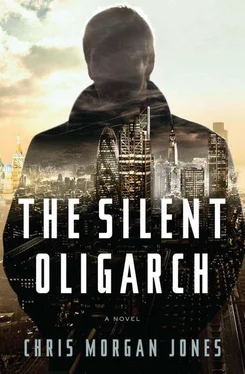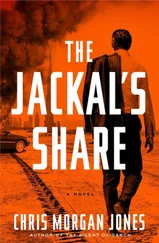His head was aching now as the vodka faded. He could feel the muscles in his shoulders tight against his neck and his back hurt. Who was he to escape? In Russia he had grown fat and timid and no longer had instincts he could trust. It was like releasing a pet dog into the wild. And if he made it, what then? A lifetime of the fear he was feeling now.
WEBSTER CAME HOME a little after midnight. He undressed in the bathroom and got into bed as quietly as he could, sliding under the duvet and lying on his stomach. Elsa was already asleep. He lay there for a moment listening to her breathing, slow and deep. She was on her side, facing him, and he could feel her breath on his neck.
“Is it over yet?” she said in a low mumble.
“I thought you were sleeping.”
“I was.”
“Sorry. No. He went to his wife’s. Ex-wife’s. He’s still there.”
“I wonder if they’re asleep.”
Webster kissed her on the forehead, turned onto his side and watched the light from the street lamps creep in around the blinds. Lock would be in bed by now, lying awake, no doubt, and considering his choices. He had to be.
The next morning he woke early, before Nancy and Daniel, who were surprised to see him up when they came down for breakfast. He made them French toast with honey and ate two pieces himself. His phone sat on the kitchen table, fully charged and ready for another day of precise little messages from George Black. There had been one this morning, sent at half past six: “Refreshed team. Subject still at wife’s residence. Unknown surveillance in place with same team and car.” Last night the mysterious Ford had followed Lock to Holland Park, to an address Webster recognized as Marina Lock’s, and George had sat discreetly behind it.
Then nothing for hours. Webster walked the children to school across the park. The rain was now falling as a soft drizzle, and their bright coats shone in the gray light. He didn’t want to go to the office. There was little point in being there. He could go to Holland Park, to be close to events, but there was no good reason for that, either. In the end, rather aimlessly, he set off walking into the city, wondering whether Lock’s reunion with his wife was a good or a bad thing. If he was trying to engage with his old life that was surely good. Webster realized with surprise that he was pleased for him.
It was half past ten and he had reached New Bond Street when his phone rang.
“George, good morning. How is it?”
“We’re not sure, Ben. We think we may have had a loss.” Christ. He checked the urge to shout.
“Go on.”
“Well. You’ll appreciate, Ben, there’s a lot of activity in the vicinity. There’s us watching the Ford and the Volvo and we’ve had to stay a long way back to make sure we’re not detected. Luckily it’s a nice wide-ish street with a sweep to it otherwise I’m not sure we’d have caught it at all.” George waited for comment but Webster said nothing. “So, nothing happened all night. We assumed he’d emerge some time around eight or nine, and we changed the team early to be ready. But there was no movement. Then at 10:13 one of the men from the Volvo, one of the bodyguards, got out and went up the steps to the house. He stood on the porch for thirty seconds or so and then he went inside. A minute and a half later he ran out of the house and down the stairs, into the Volvo and off onto Holland Park Road, heading west. The Ford followed, and we had the bike on them. But they turned off up Ladbroke Grove, and halfway down they timed the lights beautifully, took a right and there was no way we could make it. In short we lost them. From the way they did it I’d say we’d been compromised.”
“The Ford made you?”
“Yes.”
“So where are you now?”
“I’m outside Claridge’s. Our two subjects from the Volvo are in there now.”
“And where the hell is he?”
“I don’t know, Ben. There’s no way he could’ve gotten out the front door. Not with all those eyes on him. Through people’s gardens perhaps? Or over the wall into the park.”
“Holland Park?”
“Holland Park.”
Webster thought for a moment. He could be anywhere. He could be on a train to France or seven miles above the Atlantic. “Keep an eye on the Volvo. Make that your priority. Have someone at the wife’s house in case he comes back. What else?”
“Nothing useful.”
“All right. Stay in touch.”
“Sorry, Ben.”
“That’s OK. Listen, George, there’s one thing you can do. See if you can find out what card Lock’s using to pay his bill.”
He hung up. Christ, this was finely balanced—and agonizing with it. If Lock had run, that was good because he needed somewhere to run to. But if they couldn’t find him that was useless; and if Malin found him first that would be worse. He dialed the travel agent. Richard Lock hadn’t booked himself on any flights that morning. That was something. Then he rang Yuri.
Yuri was a Ukrainian who had once worked for the KGB and then for the SZRU, Ukraine’s foreign intelligence agency. He had retired from government service years before, and now ran a small intelligence company in Antwerp specializing in what he called on his Web site “technical solutions to information problems.” Much of what he did was bug things: cars, offices, houses, hotel rooms. Today Webster wanted him for something else. Yuri had a means of locating mobile phone signals, to within any particular cell, anywhere in Europe and most of the Middle East. Webster used it only in emergencies, and this qualified. He had no idea how it worked, and didn’t particularly want to find out. He gave Yuri Lock’s telephone number, a Moscow mobile, told him it was urgent and asked him to see what he could do.
As he hung up his phone immediately rang.
“Hello.”
“Ben, it’s George. We’ve checked at the hotel, discreetly, and he hasn’t checked out of his room. One of the bodyguards went off in the car. The other one’s still in there. We decided to stay put. I’m working on the credit card.”
“That’s fine.”
Webster ended the call and held the phone in his lap. After twenty seconds it rang again. He picked it up without checking the number.
“Hello.”
“Is this Ben Webster?” A voice he didn’t recognize.
“Yes, it is.”
“This is Richard Lock.” Webster felt his heart quicken. He didn’t say anything. He took the phone from his ear for a moment and looked at the screen: it was a London number, a landline. “I thought… I thought it might be useful to talk through our positions.” Lock’s voice was smaller than it had been the night before, but businesslike.
“Yes,” said Webster. “I’m sure it would.” He paused to let Lock talk.
“I’m concerned that we may be missing opportunities for a settlement.”
“Where are you calling from? You’re still in London?”
“Yes. How did you… yes, I’m in London today.”
“The number showed up on my phone. Shall we meet?”
Lock hesitated. “Er, yes. Yes. I have meetings this afternoon but I’m free now for an hour or two. Somewhere neutral, perhaps.”
“Claridge’s?”
“Probably better somewhere we won’t be seen.” Of course.
“Yes.” Webster thought for a moment. He was slightly unprepared. He needed somewhere entirely out of the way. He should have planned this. “Let me see. OK, I know. Take a cab to Lisson Grove, and get out where it meets Church Street. There’s a café on the left about a hundred yards down. I can’t remember its name but no businessman has ever been there. I’ll be there in twenty minutes.”
“Church Street. I may be a little longer. How will I know you?”
Читать дальше












